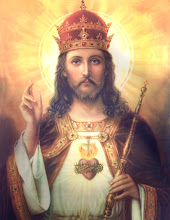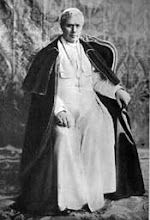Entre outras leituras a que este escriba se tem dedicado ultimamente, inclui-se o livro do autor norte-americano H. W. Crocker III, um católico de tendência tradicionalista e politicamente libertário, que escreveu uma magnífica História da Igreja intitulada "Triumph - The Power and the Glory of the Catholic Church", onde, em pouco mais de quatrocentas páginas, examina dois mil anos de História Eclesial. Não permitindo o tamanho da obra em questão a análise aprofundada que um espaço temporal tão dilatado em princípio exigiria, nem por isso H. W. Crocker III deixa de dar uma panorâmica global sobre o seu assunto de trabalho, e sempre de uma forma extremamente dinâmica, viva e sucinta, poupando o leitor a pormenores áridos que trivialmente povoam outros trabalhos deste género. Como ponto suplementar de interesse, aquele autor recusa completamente a má consciência modernista, fazendo jus aos seus pergaminhos tradicionalistas: afinal, quem mais concluiria o seu trabalho com a Oração a São Miguel Arcanjo?...
Do livro em apreço, deixa-se aqui hoje uma passagem sobre Santo Agostinho e o Império Romano. Segue o texto original em inglês, com reflexões que são de sempre:
"The victories against the heretics proved Augustine's energy and rhetorical vigor and also provided the spark for many of his books defining various aspects of the faith. But in addition to his personal confessions, his polemics, and his encyclopedic theological writings, Augustine was called to speak out on history, to explain to Christians why the very Roman civilization they had conquered and transformed from within was now divided and being torn to shreds by the wild tribes of Germany. Were men like Julian the Apostate right? Had the old gods of Rome been the city's and the empire's protectors? Had turmoil struck because the Romans turned their backs on their ancestral gods? It seemed a compelling argument, one that was picked up by Gibbon thirteen hundred years later. But Agustine said no. His massive treatise "The City of God" argued that Rome was not punished because she was Christian, but because she had failed to right herself from a course of sin. One of the most imnportant points Augustine made, which would reverberate down the history of Catholicism, was to cite the elements of Christian virtue in pre-Christian Rome. Augustine praised Rome's noble, pre-Christian Stoic philosophers. He condemned the corruption of the quasi-Christian empire. There was no comparision between the gallant legions of Trajan and the moral and physical weaklings with wich Stilicho had to make do. God, said Augustine, had recognized pagan Rome's virtues and rewarded her.
This teaching - that Christians could learn from pagan Rome, from the Stoics and other virtuous Romans - ensured that Catholicism never narrowed itself intellectually, the way Protestantism later did by relying on the Bible and faith alone, never denied history or history's complexity or its relevance to the faith, never repudiated the wisdom and the talents of the ancients, never limited Christian salvation, as in the theology of Luther and Calvin. Here are the seeds of the high Middle Ages - of Dante touring the afterlife with the Roman poet Virgil, a virtuous pagan - and of the Renaissance.
Of course Augustine's praise for pre-Christian Rome had its limits. The pagan gods, being false, far from helping Rome, accelerated its fall. Paganism sowed sexual immorality and rampant license; it removed checks from every desire and subverted the Stoic virtues that had made Rome great. Christianity, had it been truly held by the people, could have reinforced the sources of Roman greatness by stiffening Roman morality. As for God's judgment,look, said Augustine, at how the barbarians did not single out Christians for destruction or leveled churches; but they were unforgiving with symbols of paganism.
Beyond this empirical observation, Augustine added a philosophical one that became another keynote of catholic thinking: A Christian's ultimate faith cannot be in the City of Man, no matter how mighty its fortunes, for all that is built on dust will return to dust. A Christian's ultimate home is in the City of God, and that is where he should seek his salvation.
Augustine's trust in God was exemplified beyond the printed page, beyond his loyalty to his vows, to the spear point of Vandal invasion of North Africa. It was Augustine who, recognizing the danger of his times, developed the Catholic theory of just war. He knew that, unlike the Visigoths who sacked Rome, the Vandals spared no one and nothing. As they lay siege to his city - a siege that would last eighteen months - Bishop Augustine used his rhetorical skills to rally his starving people and maintain the morale of refugees who had sought sanctuary within the walls of his city. He died three months into the siege, at the age of seventy-six. Hippo, his city of man, was annihilated".
Subscrever:
Enviar feedback (Atom)
















0 comentários:
Enviar um comentário